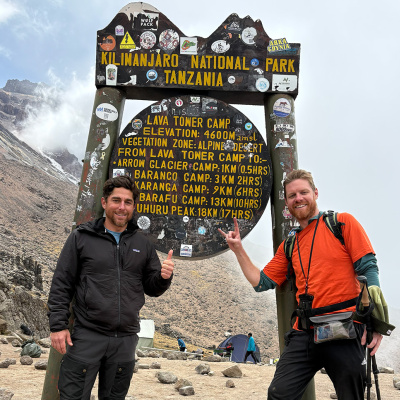How Six UT Journalism Grads are Making Their Way in 2018
Editor's note: James Jeffrey, MA '12, spent nine years in the British Army before attending UT's School of Journalism. Since graduating, he has worked as a freelance writer in both America and the Horn of Africa. For this piece, he set out to see how his graduate school classmates are faring.
It's a tough time to be a journalist. Between falling revenues in print, media companies pivoting to video (and away from traditional writers and editors), and the unrelenting cries of fake news from the president, journalism is a tough industry made even tougher during the five years since I've graduated from UT's School of Journalism.
It's refreshing, then, to look at where my classmates are now. I am left uplifted, proud even. Many who graduated with me in 2012 found journalism jobs—and are still there shedding light on America, the world, and all the accompanying confusions and contradictions that need unravelling; while others pivoted to equally important media-related careers.
Here's how six UT journalism graduates are finding their niche in the journalism and broader media world at large.

“I never planned on working on reality shows,” says Abbey Adkison, an alumna of the school photography track—when it existed, now subsumed in visual storytelling—who currently works as a senior video producer for Bustle, a female-focused news and entertainment media group in New York. Currently she is developing two new reality shows, for which she crafts storylines, chooses the people involved, and plans logistics for the semi-scripted productions.
“It was a little surprising because I never trained to do anything other than journalism, but I’m able to take the storytelling skills I’m learning by scripting and apply it back to my documentaries,” she says. “Be open to learning new things, is my advice. My work has taught me a lot about good storytelling, and producing skills—scheduling, casting, budgets—are all incredibly helpful tools for my journalism.”

Raymond Thompson runs technical production and the field and studio recording for Sparked, a podcast for West Virginia University Magazine about the people who are changing Appalachia’s future for the better. He also edits and reports for the show’s script written by his co-producer.
“I came to UT for the upper-level storytelling skills,” says Thompson, who had already worked five years as a photographer. “I found the confidence in myself as a writer, as a video producer, and I found the confidence to start a podcast.”
Thompson had expected to go back to traditional journalism after UT, but, confronted with the new reality of photographers being laid off en masse, he moved into education journalism as a multimedia producer. In addition to the podcast, he shoots still photographs and produces videos for West Virginia University’s alumni magazine.
“I knew the skills that I learned at UT were valuable but I wasn’t seeing salaries in the journalism world at the level I would be entering to reflect that fact, so I started looking at other industries that needed folks with my skillset,” he says.

Ari Phillips, a senior editor for Gizmodo Media Group's new Earther vertical, which focuses on the future of life on Earth, zeroed in on one topic to find his niche in journalism.
“Because the industry was changing so rapidly, I felt it would be useful to specialize, so I focused on environmental issues and—much to my surprise—this landed me a job right out of school,” Phillips says, of his former job as a climate reporter at ThinkProgress. “It was a small outfit with low pay, but it got me to Washington, D.C., and into the broader media world.”

Yimou Lee has lived by a few important words in his journalism career, from a phrase discovered back at UT years ago.
“I can still recall in the office of the Daily Texan there was a sign saying ‘Have Fun or Die,’ and that’s my motto for journalism,” says Lee, who landed a job with renowned international newswire Reuters, and currently covers Myanmar in Southeast Asia. “It’s a vehicle for me to go places that I otherwise wouldn’t have travelled to, and meet people I otherwise wouldn’t have met.”

Some grads, like Zhonyu Yuan, had to pull a career 180 out of necessity, though relishes what he took from the journalism program at UT.
“Under China's new presidency, doing journalism is simply too hard, there are many limitations, censorship, and the state-owned enterprise bureaucracy involved,” Yuan says. He now works at the U.S. Consulate in the Chinese city of Wuhan, though he still feels his UT graduate journalism degree was worth it. “Though I didn't become a reporter, skills learned like writing, photography, and multimedia production still benefit me now. I sometimes consider myself as a journalist or messenger in conveying foreign culture to local audiences.”

Mario Carillo is another graduate of 2012 who didn’t end up in journalism, a source of mixed feelings for him.
“Not being a journalist bothers me only in the sense that I feel I have the tools to be a good reporter,” says Carillo, who works as communications director for America’s Voice, a nationwide advocacy group for immigrants and their families. “But I’m very proud of the work I have done in the field of advocacy—having the opportunity to work so closely on immigration, an issue that is very personal to me, has been a life changing experience.”
Journalism remains a tough field to break into, even with a degree. But UT graduates are proving it’s both doable and not as daunting as current circumstances indicate. The caveat, though, is that it may take some readjustment, a move to the other end of the globe, or moving into a different field. The key, for each person, is the skills they honed while studying journalism on the Forty Acres, no matter where they end up.






